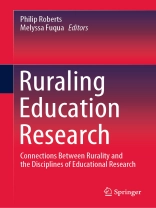This edited volume brings together a collection of chapters from leading scholars in rural education with the purpose of linking knowledge from the rural education field to the wider discipline of education studies. Through addressing significant issues in the rural education field, the book gives insights from rural education that have general relevance for the wider disciplines of education, and provides up-to-date scholarship in research in rural contexts.
This book aims to be a definitive and comprehensive edition of contemporary rural education scholarship that works as a guide for those new to researching in and for rural contexts, as well as actively expand the other sub-fields of education from a rural perspective. It examines the connection between rurality and the other domains of educational research, exploring what a rural perspective might bring to the broader fields of educational research, and how it might evolve them. In its unique approach, this book brings the concept of ‘rural’ to the disciplines of education; chapters regarding the ethics of research in the rural context speaks to a gap in rural education, and provide tools for engaging marginalised communities more generally in educational research.
Содержание
Ruraling education research.- Framing rural and remote: Key issues, debates, definitions and positions in constructing rural and remote disadvantage.- Rural social space: A conceptual-analytical framework for rural.- (Teacher) education and the rural human services.- Exploring the interplay of the ‘Rural’ and ‘Community’ in and for teacher education research.- The rural community walk: A structured learning experience for understanding place.- Using rural frameworks and research to develop understandings of educational justice and equity across socio-spatial settings.- Charter schools and the reconfiguring of the rural school-community Connection.- Erasing rurality: On the need to disaggregate statistical data.- Pathways, principals, and place.- Can boarding be better? Ethical dilemmas for policy-makers, education providers and evidence-makers.- Using rural education research to rethink literacies pedagogies.- How can rural education research make inclusive education better?- Linguistic landscape methodologies in rural education and educational research.- Dancing koalas, burning books and ‘fair game’: Using Butler’s concept of performativity to examine rural gender performances.- Harnessing social capital in rural education research to promote aspiration and participation in learning.- The invisible cohort: Remote students’ engagement and success in higher education.- The politics of ethics in rural social research: A cautionary tale.- Valuing the rural: Using an ethical lens to explore the impact of defining, doing and disseminating rural education research.- People, places, and communities in an urban century: Broadening rural education research.
Об авторе
Dr. Philip Roberts is Associate Professor in Curriculum Inquiry and Rural Education at the University of Canberra, and leads the Rural Education and Communities research group within the Centre for Sustainable Communities. He was Chief Editor of the Australian and International Journal of Rural Education (2015–2018), is on the Editorial Board of the Journal of Research in Rural Education (2014–current) and currently Associate Editor of the international journal, Curriculum Perspectives (2018–current). He has served as the national convener of the Rural Education Special Interest Group of the Australian Association for Research in Education 2015–2018 and as the co-convenor 2013–2015. Dr. Roberts is at the forefront of the rural education field in Australia, and internationally. Utilising a plurality of methods, he has been leading innovation in rural education through links with the international field of rural studies (incorporating rural sociology and rural geography) and numerous leading international rural studies organisations. His work is orientated towards trialling new approaches to researching rural education and engaging with rurality in education.
Dr Melyssa Fuqua has a Ph D from Monash University. Her thesis explored through narrative inquiry how rurality shapes the work and experiences of Australian pathways advisors. In addition to having taught at a K-12 school in rural Australia, Melyssa has taught in the Education Faculties at Monash University, the University of Melbourne, and Federation University. Melyssa is also in a number of research-related leadership roles with a focus on rural education and engagement. She is a co-convenor of the Australian Association for Research in Education’s (AARE) Rural Education Special Interest Group and is on the Executive Committee of the Society for the Provision of Education in Rural Australia (SPERA). Additionally, she represents SPERA in the Australian Alliance of Associationin Education (AAAE) and is an elected member of their Board of Directors. Melyssa is a co-manager of the Rural Education Research Student Network that connects research students, early-career researchers, and experienced scholars who have an interest in rural education research. While this network is mainly digital, it also holds annual International Emerging Rural Scholars Summits in conjunction with major rural research conferences around the world. She is also on the editorial team of the Australian and International Journal of Rural Education.












